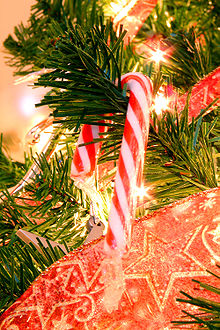Cookbook:Cooking for Christmas
|
The text in the column below is editable at Cookbook:Christmas:
Cookbook | Recipes | Ingredients | Equipment | Techniques | Cookbook Disambiguation Pages Christmas!edit Christmas, December 25 for most non-orthodox Christians, or January 7 for most orthodox Christians, is a day set aside in the liturgical calendar to celebrate the birth of Christ. In a larger sense, the Christmas holiday also involves a variety of customs which are only loosely related to, or not at all related to, Christian tenets. There is a period of about a month leading up to Christmas called Advent, to build excitement, and a 12 day period beginning on Christmas Eve (the 12 days of Christmas) which ends with Epiphany, however they are less widely celebrated. It is traditional to have a Christmas lunch or dinner, with as many family members and/or friends as one can reasonably gather together. In the days leading up to Christmas it is traditional to prepare and have available ‘extra’ desserts, especially cookies and confections, and even to prepare them for the purposes of giving them to others as token/small gifts. In the days leading up to Christmas visiting friends and family, whether informally or for a party, is not unheard of. Overall, there is a strong emphasis on getting together with others (and eating). It is not entirely uncommon for cooks to look to older customs and traditions for inspiration when choosing foods for Christmas meals and get-togethers. Where Christmas occurs during the winter one may notice a tendency toward foods that, in the past, prior to refrigeration and canning, were then still available in deep winter (think dried fruits, sugar, baking), as distinguished from foods more readily available other times of the year. While many of us are no longer forced to follow what the seasons dictate with respect to food choices, it can still be a helpful guide, giving room for lagniappe. Some things to consider:
|
|